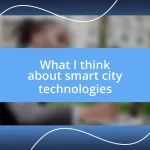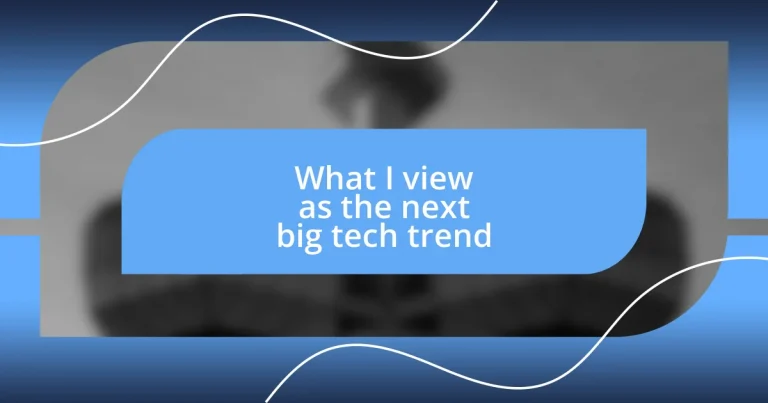Key takeaways:
- Emerging technologies like AI and blockchain are reshaping businesses and daily life, offering enhanced efficiency, personalized experiences, and fostering trust through decentralized systems.
- Key indicators of tech trends include consumer adoption rates, significant investment flows into specific sectors, and supportive regulatory changes that drive innovation.
- Future advancements in technology, such as AI, quantum computing, and augmented reality, promise to revolutionize daily interactions, problem-solving, and educational experiences.
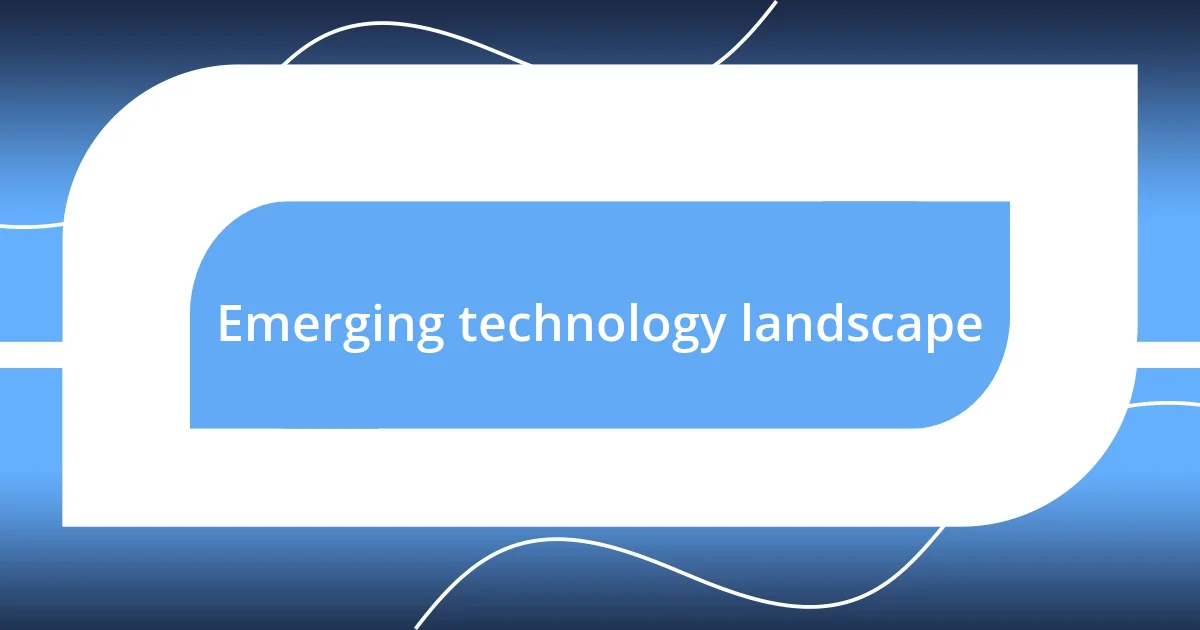
Emerging technology landscape
As I delve into the emerging technology landscape, I can’t help but feel a sense of excitement about how rapidly things are shifting. Recently, I attended a tech conference where I witnessed firsthand the innovative spirit driving developments in artificial intelligence and blockchain technologies. It’s fascinating to see how these advancements weave into the fabric of our everyday lives.
I often ponder how these emerging technologies will reshape industries we’ve taken for granted. For instance, my friend who runs a small e-commerce business is contemplating integrating AI to enhance customer experiences. This makes me wonder—how many other small businesses could thrive by harnessing these powerful tools?
Reflecting on my own experiences, I recall a moment when I used a voice assistant for the first time. That sense of wonder ignited a curiosity within me about the possibilities these technologies could bring. The emotional connection we form with technology speaks volumes about its potential to affect our lives profoundly.
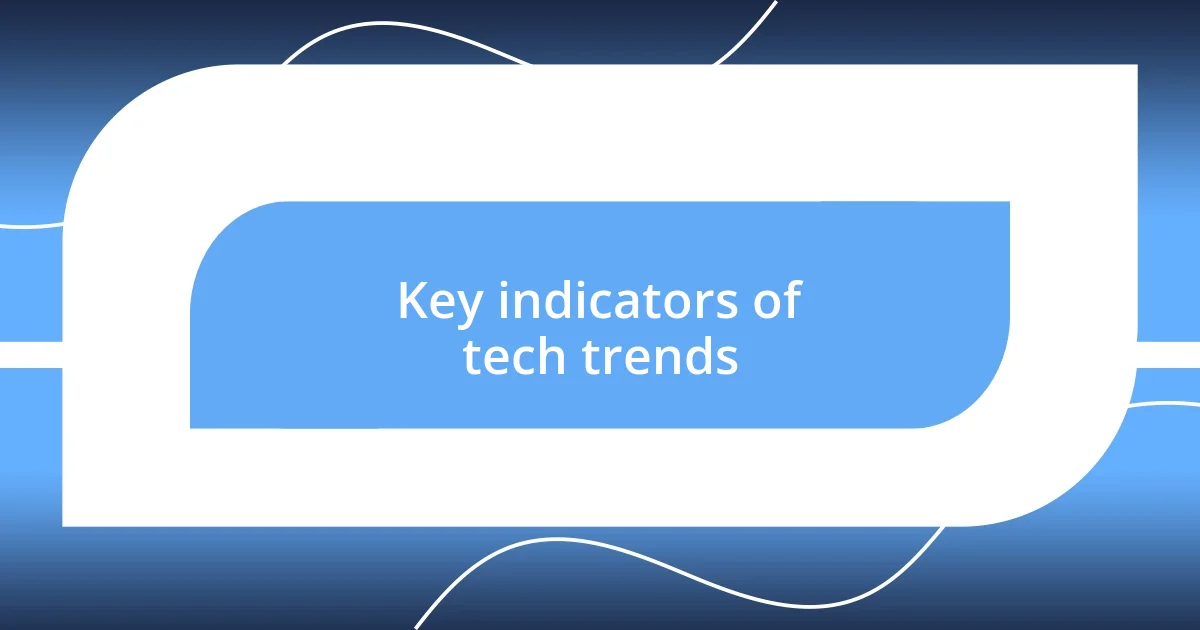
Key indicators of tech trends
One of the most telling indicators of tech trends is consumer adoption rates. I remember when smartphones first emerged; they quickly became must-have devices for almost everyone. Similarly, I watch today as more people gravitate toward wearable technology, reflecting a shift in how we desire to integrate tech into our daily routines. It’s these rapid shifts in behavior that often signal the next big trends.
Additionally, the investment flow into specific sectors provides crucial insights into future technology directions. For instance, venture capital funding in artificial intelligence startups has skyrocketed over the past few years. When I attended a pitch event recently, I was astounded by the diversity of innovative solutions presented, ranging from healthcare advancements to marketing automation. This convergence of interest suggests a collective belief that AI will fundamentally change our lives.
Finally, regulatory changes and institutional support can also highlight emerging tech trends. I’ve seen how governments’ interest in blockchain technology can foster a fertile ground for innovation. At a local tech meetup, I chatted with entrepreneurs eager to harness these regulatory frameworks to launch new solutions. It’s invigorating to think about how these supportive environments can spur the next wave of technological breakthroughs.
| Key Indicator | Description |
|---|---|
| Consumer Adoption Rates | How quickly people embrace new technologies, such as smartphones or wearables. |
| Investment Flow | The amount of funding directed towards specific tech sectors, indicating market potential. |
| Regulatory Changes | Government policies that can either support or hinder technological advancements. |
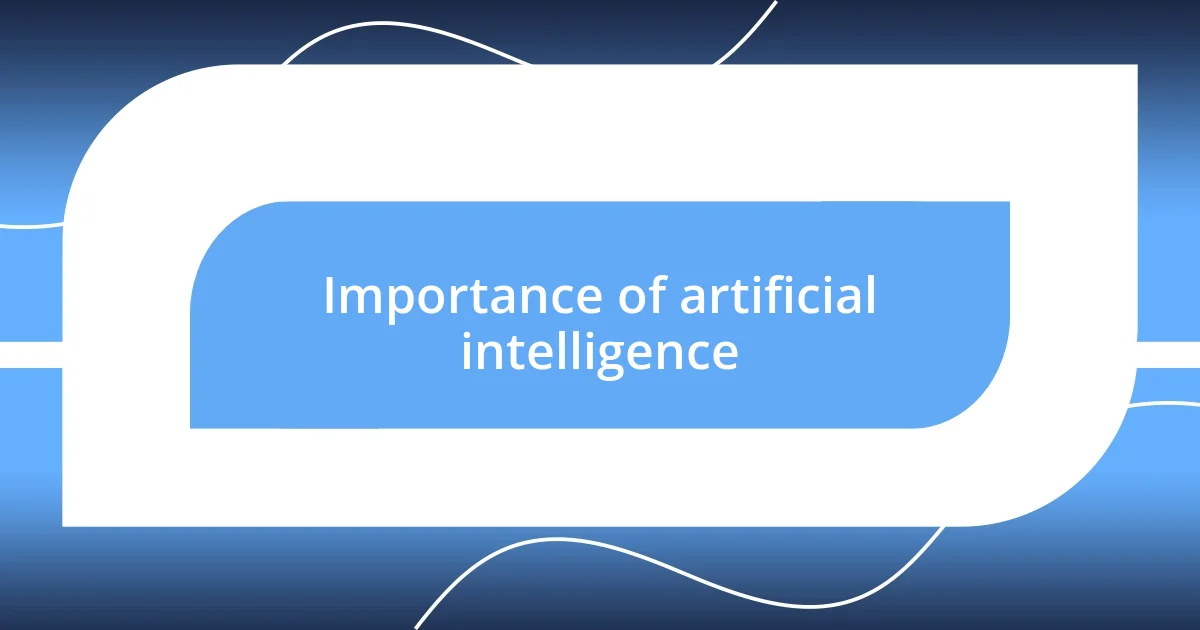
Importance of artificial intelligence
The importance of artificial intelligence (AI) cannot be overstated. From personal experience, I’ve seen how AI can transform mundane tasks into streamlined processes, dramatically boosting productivity. For example, I once worked on a project using AI-powered analytics that revealed insights I never would have uncovered manually. It felt like having a secret weapon that not only saved time but also enhanced decision-making capabilities.
- Enhanced Efficiency: AI systems can process vast amounts of data faster than humans, automating repetitive tasks.
- Personalized Experiences: AI enables tailored recommendations in online shopping or streaming platforms, based on individual behavior.
- Improved Healthcare: AI is revolutionizing healthcare through predictive analytics, enabling earlier disease detection and personalized treatment plans.
I often marvel at the ways AI can replicate human-like interactions. During a recent online customer service experience, I interacted with a chatbot that understood my queries and provided solutions almost intuitively. It got me thinking—this is just a glimpse of how AI can enrich customer relationships while freeing up human agents for more complex queries. The emotional relief and satisfaction in getting quick, accurate answers made me realize how crucial AI is for improving everyday experiences.
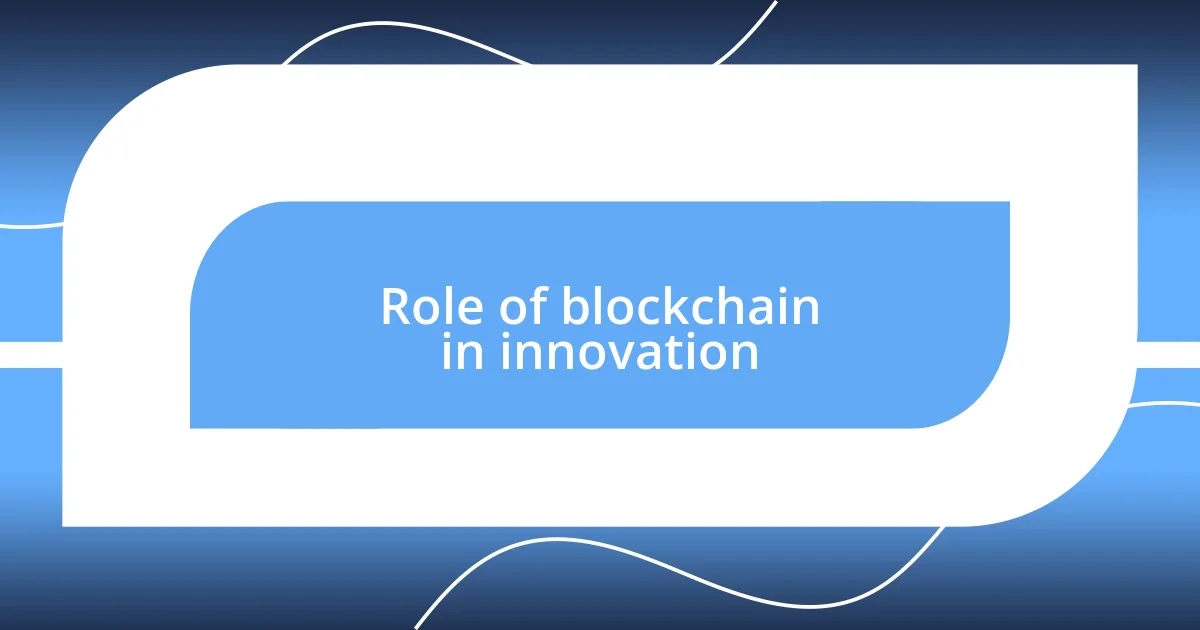
Role of blockchain in innovation
Blockchain technology is like a sturdy foundation for innovation, but its true potential lies in its capacity to foster trust. When I first dove into the world of blockchain, I was fascinated by how it enables secure transactions without needing a central authority. For example, I recall attending a seminar where a developer showcased a blockchain-based voting system that promised transparency and reduced fraud. It made me wonder: what other areas could benefit from this newfound trust?
Moreover, the ability of blockchain to facilitate decentralized applications is genuinely groundbreaking. I once participated in a hackathon where we created a decentralized marketplace utilizing blockchain. It was eye-opening to see how our peer-to-peer transactions could occur without an intermediary, leading to reduced costs and more direct relationships. Have you ever thought about how much trust we place in middlemen? With blockchain, that’s redefined.
Finally, the role of blockchain in supply chain management is particularly captivating. I remember reading about a company that tracked organic produce from farm to table using blockchain. It resonated with me, as I often question the provenance of what I consume. This transparency not only reassures consumers but also pushes other brands to adapt to more ethical practices. Isn’t it amazing to think how technology like this can shift entire industries towards greater accountability?
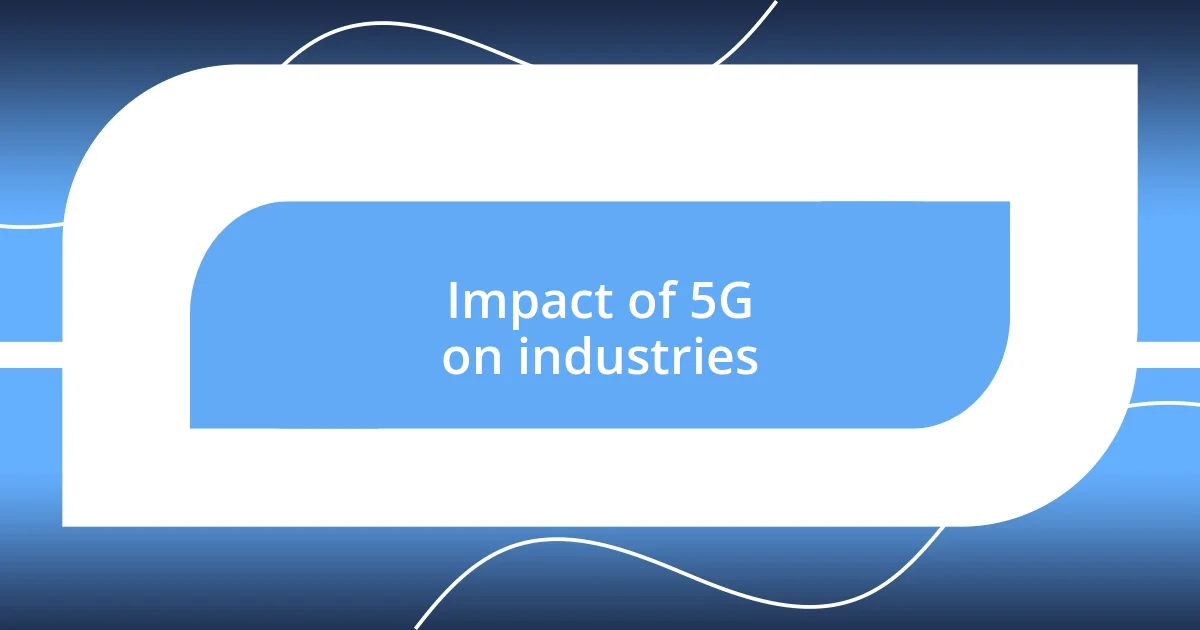
Impact of 5G on industries
5G technology is poised to revolutionize industries by enabling faster data transmission and lower latency. I remember my excitement when I attended a demonstration showcasing how 5G applications could enhance remote healthcare. Doctors were able to perform real-time consultations and even assist in surgeries from thousands of miles away. That moment made me realize the profound impact 5G could have on accessibility and the quality of care patients receive.
The manufacturing sector stands to gain significantly from 5G as well. Imagine a factory floor filled with interconnected devices communicating instantly. My friend works in a manufacturing plant adopting 5G, and he shared how the operational efficiency skyrocketed when machines could transmit data in real-time for predictive maintenance. This reduces downtime and costs, which is a game-changer for production schedules. It’s fascinating to think about how much more responsive industries can become.
Transportation and logistics are yet another arena where I see 5G having an impact. With the rise of autonomous vehicles, the ability for these cars to communicate with each other and infrastructure is crucial. I’ve explored simulations of smart cities where 5G connects traffic systems and vehicles, reducing congestion and optimizing routes. It’s not just about speed but enhancing safety and making our cities more livable. Doesn’t that paint a promising picture of the future?
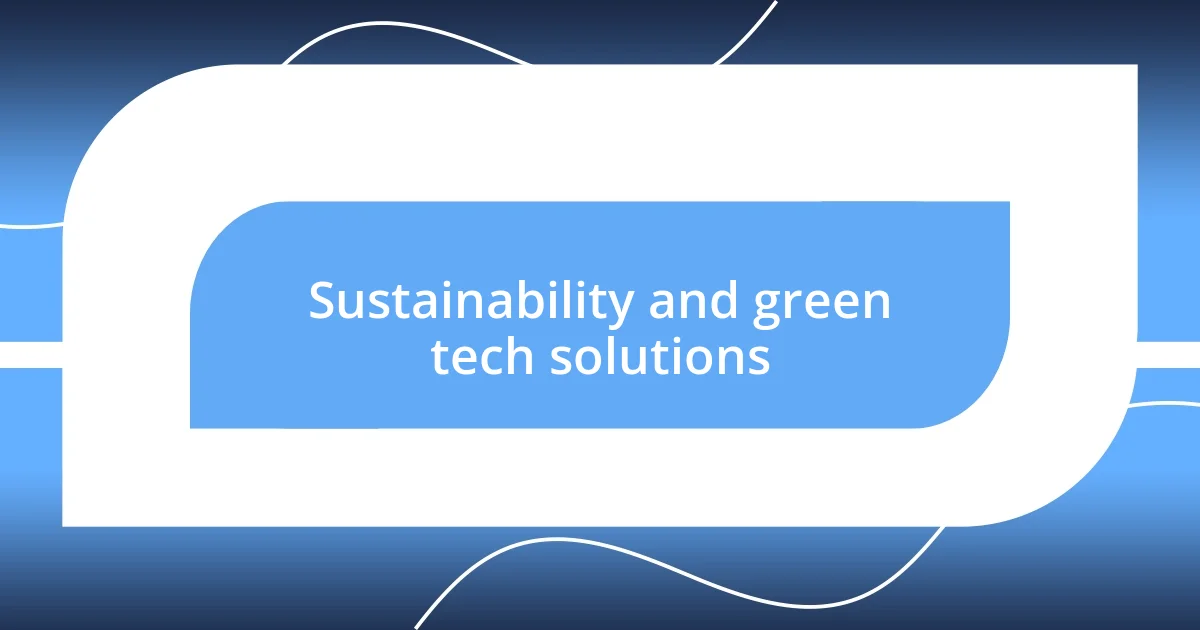
Sustainability and green tech solutions
Sustainability and green tech solutions have truly captured my attention lately. Take renewable energy, for example. I recently attended a community event featuring solar panel installations, and seeing those panels in action really made me think about how accessible clean energy can be. After all, it’s not just about benefits for the environment; families can save significantly on energy bills. Have you ever considered how much money could be left in our pockets simply by switching to cleaner alternatives?
Another impactful area I’ve observed is electric transportation. When I got the chance to test drive an electric car, I was struck by its silent efficiency and smooth acceleration. It felt like stepping into the future. I still remember the thrill of knowing that I was reducing my carbon footprint on every drive. Isn’t it inspiring to think about how adopting such technology can help us tackle climate change while enjoying a superior driving experience?
Lastly, I find the concept of sustainable agriculture to be especially fascinating. I once visited an urban farm that utilized vertical farming techniques. The innovative use of space and resources left me in awe, as the produce was grown using 90% less water than traditional methods. It got me thinking about how focusing on such strategies can help feed an ever-growing population while preserving our precious environmental resources. How can we not support solutions that align progress with sustainability?

Future predictions for tech advancements
I see artificial intelligence (AI) becoming far more integrated into daily life in the near future. Just recently, I played around with an AI writing tool that helped me brainstorm ideas. It was impressive, but what struck me more was the potential for these tools to evolve into personal assistants that anticipate our needs. Imagine having a device that not only schedules your appointments but also understands your preferences so well that it suggests activities you love. Can you envision the possibilities of that level of convenience?
As I think ahead, I can’t help but get excited about the advancements in quantum computing. I remember attending a tech conference where the speaker explained how quantum computing could solve complex problems in seconds that would take today’s supercomputers years. It felt like a scene from a sci-fi movie! This leap in technology has the potential to dramatically advance fields like drug discovery and climate modeling, making it essential for addressing some of humanity’s biggest challenges. But what if we realize we can truly compute the previously unimaginable?
Lastly, I’m convinced that augmented reality (AR) will reshape how we interact with the world around us. I had a chance to experience an AR game recently, and it was exhilarating to see virtual objects blended so seamlessly into my actual surroundings. This tech offers not only entertainment but also valuable applications like remote education and training. Imagine students conducting physics experiments in their living rooms! How will it change our learning modalities if education becomes this immersive and interactive? The future certainly seems bright with these advancements on the horizon.









